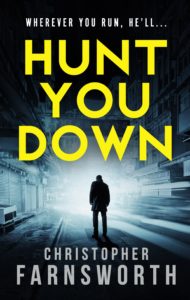Christopher Farnsworth – Everything is Porn Now
Today I am delighted to welcome Christopher Farnsworth to Grab This Book as I host the latest leg of the Hunt You Down blog tour.
The information you need about Hunt You Down can be found by scrolling down to the foot of this post. However, before you zip down (as it were) I have a brilliant guest post from Mr Farnsworth to share and it has the most eye-catching title. Bring on the bots when this hits Twitter…
Everything is Porn Now
I write about the Internet a lot. I covered it as a reporter, and as a novelist, it’s become the weapon of choice for the bad guys in my books. In my latest, HUNT YOU DOWN, there’s a criminal genius who’s learned how to weaponize social media.
 But the most insidious thing I’ve seen on the Net is actually happening in real life. And I’m not sure how we stop it, or even if we can.
But the most insidious thing I’ve seen on the Net is actually happening in real life. And I’m not sure how we stop it, or even if we can.
The Internet has turned everything into porn.
I don’t mean that literally. The Internet is, of course, the greatest advance in human communication yet. And you can still find many sites — at least a couple dozen — that do not have actual naked people on them. Also, I am not taking a moral stand against pornography here. (I’m not quite that hypocritical yet.)
But what I have noticed is that the Internet is making everything — everything — quick and dirty and cheap, if not free.
Which is pretty much the definition of porn these days.
Porn was first spread on the Internet before there were even web browsers — people would break down naked pictures into binary code and then send those files over the old Usenet sites. (Don’t ask me how I know this.) But eventually, the process sped up, and soon, people were sharing porn videos for free over the Net.
That was just the beginning. Today, every form of media faces the same commoditization that wreaked havoc in the porn business.
Music was first. Way back when I was a tech reporter, I covered a new software application called Napster. In those pre-iTunes days, I used Napster on my computer at work to download every single I could remember from junior high, music that would have cost me hundreds of dollars in CDs if I’d even been able to find them. At the time, I thought this was pretty great.
I interviewed a lawyer who worked for the recording industry as part of my story, and he didn’t see it the same way. Before we’d finished talking, he’d told me that everything I’d done was illegal, and the industry would soon be suing people like me. He told me I was contributing to the destruction of the music business. I was skeptical, to say the least.
But he was right. The recording industry did sue people who illegally downloaded music, for all the good it did them. People used Napster and services like it to grab millions of songs for free. By the time iTunes and other legitimate services got up and running, the industry had been hollowed out. Billions of dollars in revenue simply vanished. Revenues have made something of a comeback as people subscribe to streaming services, but overall, it’s still less than half what it once was.
 Pick any other media industry, and you’ll find a variation on the same story. Newspapers were gutted by Craigslist as people discovered they could use the Internet for free classified ads and free news. Book publishers have to reckon with a flood of cheap ebooks and Amazon’s rise as the number one bookseller in the world. TV and movies have to compete with YouTube and random cat videos for eyeballs. Musicians, authors and artists are expected to give away their work in an effort to build an audience and a brand.
Pick any other media industry, and you’ll find a variation on the same story. Newspapers were gutted by Craigslist as people discovered they could use the Internet for free classified ads and free news. Book publishers have to reckon with a flood of cheap ebooks and Amazon’s rise as the number one bookseller in the world. TV and movies have to compete with YouTube and random cat videos for eyeballs. Musicians, authors and artists are expected to give away their work in an effort to build an audience and a brand.
All of these businesses were once highly profitable and stable, employing millions of people. I remember sitting in an auditorium during my last newspaper job as our publisher complained about a 12 percent profit margin that year, and promised he’d get it back up to 20 percent where it belonged. That paper has filed for bankruptcy twice since then.
The porn effect isn’t limited to media, either. Uber is basically the free-porn model applied to taxicabs: investors subsidize a low-cost alternative to an established industry to extract revenue from its paying customers, and eventually crash the old business.
And the Internet isn’t done with us yet.
Since the collapse of the DVD and pay-per-view model, porn has also become harder and more explicit to capture the attention people in a fraction of a second — when everything is available, it’s hard to stand out from the crowd.
In order to chase an increasingly fragmented audience, the spectacle has to get bigger, more outrageous, louder, more extreme. Which may be why the news media spent so much time turning a sideshow like Donald Trump into the main event.
I’m not sure where it ends. We’re hardwired to pay attention to the brightest lights and the loudest noises. (Adding naked people into the mix doesn’t hurt, either.)
But eventually, the bill is going to come due for all this free stuff. And then we’ll get to see the real cost of doing business in the new world.
Christopher Farnsworth is the author of six novels, including HUNT YOU DOWN, available from Bonnier Zaffre.
Hunt You Down:
John Smith is no ordinary gun for hire.
Smith is a man or rare gifts, and he knows your every thought . . .
Hired to track down a shooter targeting the rich and famous, Smith must complete his mission before another attack takes place. But when a website on the dark net is found to have connections to the murders, Smith realises that taking down a shadowy figure who has weaponised the internet will prove more difficult than he first thought.
And no matter how hard he tries, this criminal mastermind continues to remain one step ahead.